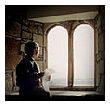The Belt of Truth 1
Posted by Anne on Jun 17, 2014 in Writing | 5 commentsI knew something was seriously wrong when I couldn’t find the keys.
Not the keys to my house, but the keys the Holy Spirit gives us to unlock the door of destiny. Every other part of an entrance makes its appearance in Paul’s description of the Armour of God so, by my reckoning, keys should be there as well.
The words for door and threshold both turn up without any mask or disguise. Thureos, the word for shield, comes from the Greek for door while belos, the word for fiery darts, is identical to belos for threshold. They’re not hard to identify. In addition, there are transparent allusions to pillars or doorposts, hinge, lintel, gate and mezuzah (the memorial box devout Jews affix to their doorways), some of which we’ve already looked at in this series.
But no keys.
Odd.
Perhaps, I thought to myself, it’s a pun like the darts/threshold of belos. So I spent time in Greek looking at the words for keys. In the process I discovered that Cleopatra possibly means keys to the fatherland and that she’d once owned the town where Jesus talked about keys to the kingdom. But there was no evidence of keys in Ephesians 6. Not deterred, I looked up the Hebrew words but had no joy there either.
Convinced that the Holy Spirit wouldn’t have allowed Paul to leave a reference to keys out entirely, I began to consider it might be more subtle. If there wasn’t a direct reference to a key, what about something that could symbolise a key? Okay, sure, usually it works the other way: in our century, keys are used as symbolic elements in their own right, pointing to knowledge, understanding, access, right to lock or unlock. I couldn’t think of anything that operated in reverse: a symbol that pointed to a key. But of course there is one.
…unto us a Child is born, unto us a Son is given; and the government will be upon His shoulder… Isaiah 9:6 NKJV
When a father wanted to pass authority to his son, he’d place a set of keys on his shoulder. The shoulder is therefore symbolic of keys which in turn represent authority.
Brilliant!
Except for one thing. There isn’t any shoulder mentioned in the Armour of God, either. I was about to abandon the quest for the keys when it occurred to me to wonder what a first-century Roman soldier’s belt looked like. It was natural to assume it went around the waist, but did it? The answer is: not always.
 Sometimes it went over the shoulder and diagonally across both back and front, like a medieval baldric. In fact, both these names—belt and baldric—are derived from the word ‘balteus’. So, can we be certain Paul’s ‘perizonummi’ was a metal-studded cingulum around the waist and not a jewel-encrusted balteus over the shoulder? Actually, I don’t think we can. It all depends on what osphus means and, although it is usually translated waist or loins, it can also mean backbone. Making balteus a viable possibility.
Sometimes it went over the shoulder and diagonally across both back and front, like a medieval baldric. In fact, both these names—belt and baldric—are derived from the word ‘balteus’. So, can we be certain Paul’s ‘perizonummi’ was a metal-studded cingulum around the waist and not a jewel-encrusted balteus over the shoulder? Actually, I don’t think we can. It all depends on what osphus means and, although it is usually translated waist or loins, it can also mean backbone. Making balteus a viable possibility.
Of course, if this was Paul’s reference, the belt of truth acquires entirely different overtones. In evoking keys, it points to truth as foundational to authority.
When we gird ourselves in truth, we step into our authority.
Simples. Howzat for an amazing, awesome key?


I may be uncertain about how the belt was worn, but not about its significance. As Christians our authority can ever only be Truth. The World is drowning in lies and it is Truth which separates us from such an environment. When we are engaged in spiritual and moral battles it is Truth which keeps our battledress secure.
Really appreciated the insights presented.
Thanks anne
Hi Ray – thanks for your comment. I think the significance of how the belt was worn only comes into play when we consider that ‘shoulder’ was intrinsically associated with ‘keys’ in Hebrew thought. You’re right about how protective Truth is in the current environment.
Regarding the connection here between authority and shoulder: when I was young there was an expression ‘shoulder up’ which was the equivalent to today’s ‘man up’. There was also ‘shoulder the responsibility’ which meant to take the full weight of responsibility or blame for whatever was going on.
Certainly proves that if you seek you will find. I hadn’t really connected truth and authority before as a foundational thing. But after some recent study into spiritual growth, I have found that truth (and realising it in personal application) undergirds everything.
Alison
Hi Alison – it makes sense when you think about it. If we build our lives on a lie, or our thinking on falsehood, we won’t have the authority to deal with an issue when the inevitable crisis presents itself.